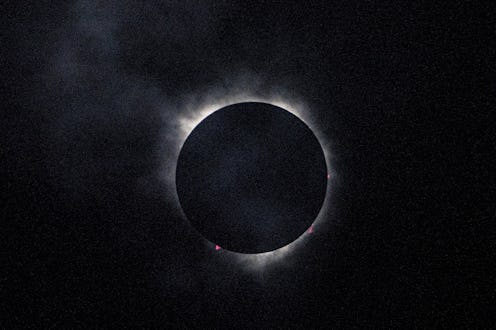Life
You May Be One Of Many Experiencing This Unpleasant Phenomenon Post-Eclipse

Unless you're a castaway recently returned from a deserted island with no signal, you're aware that the total solar eclipse on Aug. 21 could literally roast onlookers' eyes in their sockets. Protection was available in the form of dorky glasses, but following the eclipse, post-eclipse hypochondria has pretty much taken over. Honestly, between the massive, public recalls of fake glasses and simple human nature, we never stood a chance against the lure of the WebMD spiral.
In the weeks leading up to the big day, dozens of scientists and doctors warned the public not to look directly at the sun during a partial eclipse. Even a few seconds of viewing without protection can cause permanent eye damage by essentially cooking your retina to a crisp. According to Mashable, Google searches for phrases like "solar eclipse headache," "seeing spots," and "eyes hurt" spiked in North America on Monday, particularly around 3 p.m. Not-so-coincidentally, that's about when the eclipse ended on the eastern coast.
You know that time you got a headache that was almost certainly a migraine, but you couldn't help Googling your symptoms until it was 2 a.m. and you were calling your dad to tell him you had a brain tumor? That's basically what the United States is doing right now. We are all this hyperventilating owl.
Nowhere is this more apparent than Twitter.
A quick scan of Twitter shows that post-eclipse hypochondriacs are in good company.
To be fair, eye damage is a real concern that may not show up until the next day. It doesn't help that most stores sold out of viewing protection early, and a fair amount of solar eclipse glasses were recalled in the weeks leading up to the event for not meeting safety standards. One coffee chain even recalled their glasses on the big day itself. Can you blame people for worrying that they damaged their eyesight even with protection?
In the event that you haven't searched for the symptoms of eclipse-related eye damage yourself, they might include blurred vision and clear spots. If you're worried, a professor of vision science and optometry suggested to NPR to get yourself checked out by an optometrist, who will refer you to a specialist if necessary. Unless a doctor has confirmed some sort of damage, though, it's probably best to hold any cyberchondria in check — and maybe stock up on reputable solar protection for 2024.